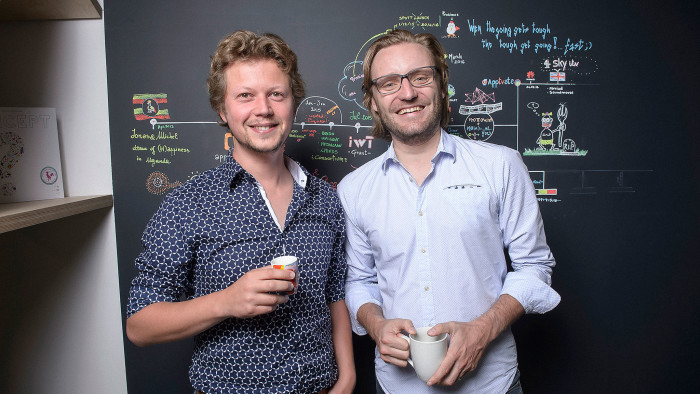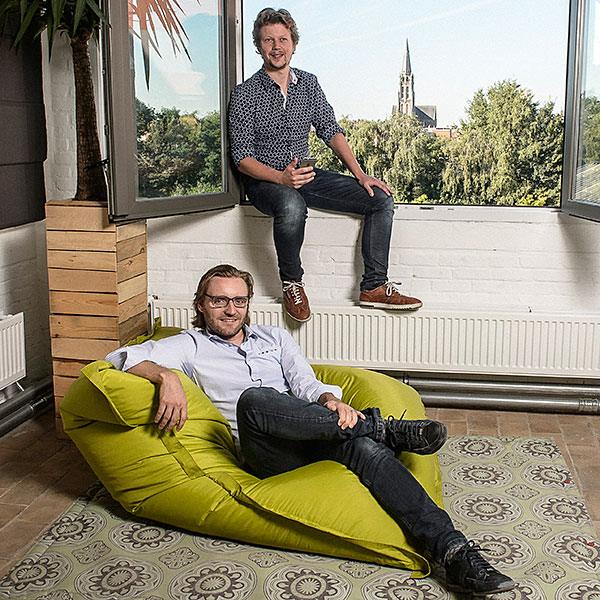EMBA graduate’s app helps TV viewers buy what they see on screen

Roula Khalaf, Editor of the FT, selects her favourite stories in this weekly newsletter.
Jonas De Cooman’s decision to become a tech entrepreneur has taken him from white coats to fashion labels.
Science was the Belgian’s first love. But even before completing his masters degree in biotechnology and food science at the University of Leuven, De Cooman had decided he wanted to be in business rather than research. As a result he went to Vlerick Business School to study for a masters qualification in economics and general management.
“I saw that working in labs was not at all for me,” he recalls. “It was too introverted.”
De Cooman went further, deciding he wanted to be his own boss, following encouragement from an early employer, Unilever. There he had gained experience as a brand manager for the two largest margarine lines in the consumer goods company’s Benelux business unit.
It was during his time in this role that he launched YouBridge, a not-for-profit organisation providing technology and mentoring support to help students in developing countries create digital projects.
Becoming an entrepreneur felt good, De Cooman claims, because it enabled him to use both his “right brain” creative side with his more contemplative “left brain” persona. “I am driven by personal growth,” he says, adding that this also explains why he has spent so much time in formal education. “I have always followed the passions of my heart.”
YouBridge was always intended as a sideline to a salaried role, according to De Cooman. But during a trip to meet YouBridge participants in Uganda, he found someone who he felt could be a co-founder in a full-time venture.
Michel De Wachter was a volunteer with YouBridge, but shared De Cooman’s interest in starting a business. While still on the trip the two men started planning what is now their full-time venture, digital marketing business Appiness.
The concept they hatched in a bar in Kampala was a smartphone app to enable people to buy the products they see on their favourite television programmes.
Spott, the name they gave to their app, enables users to find out where to buy items they can see on screen during advertisements and certain television programmes, such as The X-Files and The Big Bang Theory. Using metadata linked to what is happening on screen, Spott identifies the price of items users can see, such as clothing, and links to the website where they can be bought.
“We want to take an inefficiency out of the market in the form of search costs,” De Cooman says. “We improve the lives of our customers, the viewers, by creating inspiration for purchases linked to their favourite TV programmes.”

De Cooman also returned to business school to develop his skills as an entrepreneur, this time on the part-time executive MBA course run at the London campus of the University of Chicago’s Booth School of Business. He chose to study part-time because he was still developing the business plan for Appiness while working full time for the European division of Coca-Cola, overseeing developments in brands such as Sprite.
De Cooman believes he had gone as far as he could in his career as a marketing executive and that entrepreneurship was a way to stretch himself further. “I felt that I was not learning at the same pace that I used to be learning at the start of my career,” he recalls. “I chose to study again because I didn’t feel equipped enough to be an entrepreneur.”
While De Cooman signed up for all the entrepreneurial courses he could on the EMBA programme, he gained more than an education at Booth as he raised from his 210 classmates more than half of the €1.5m needed to launch Appiness. This degree of support in turn encouraged two angel investors to put in a significant sum of money, with a €470,000 subsidy from the Belgian government completing this initial funding round.
De Cooman believes he won the support of his fellow students at Booth in part because he involved them in his business planning, for example asking them to test out the early iterations of his technology in study breaks.
“The trick of doing business is to be able to create serendipity,” or fortunate happenstance, De Cooman says, although he admits that there were a stressful few months when he and his co-founder had to wait for lawyers to conclude the deal structures for investors. “You are awake from three o’clock because there is so much pressure on your shoulders,” he admits. “There have been a few of those moments in the life of Appiness.”
Mostly, however, “the stars have aligned”, he says, and the challenge will be learning how to unblock such “bottlenecks” as the business grows — hopefully creating a further helping of serendipity.

Jargon buster: ‘Sustainability’
The problem with some of the worst excesses of business jargon is the way that it ruins perfectly good words. Possibly the prime offender in this category in recent years has been the word “sustainability”.
A lawyer’s objection can be sustained by a judge, a person’s life may need to be sustained by a drink of water, but a sustainable business is a tautology. If you cannot sustain operation of the business model you have come up with then your venture is a failure.
And there is the rub. One reason sustainability appears to have become so important in the start-up world is the fact that so many technology-based business ideas prove to be unworkable. There may be an app for everything, but that does not mean that every app can make money. Just saying that you are working towards a sustainable business model does not cut it.
The only hope is that we are in a sustainability bubble, running alongside the tech bubble that fostered so many other jarring and misleading jargon words in recent years, such as unicorns (they do not exist) and the sharing economy (it is not really when you are being paid less than the minimum wage).
It was OK when it was just the green movement talking about sustainable life forms. Hopefully we will soon return to this natural order and the use of sustainability in relation to business will go the way of the dinosaurs.
Comments